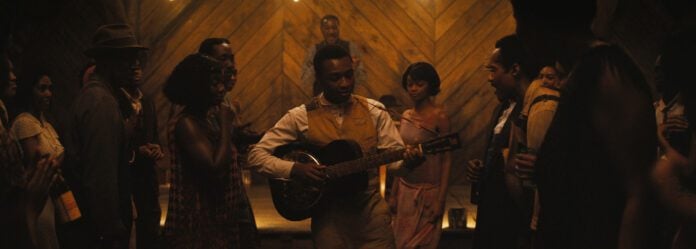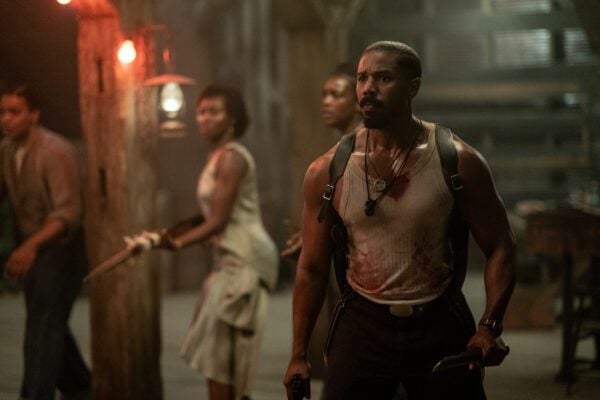
“Sinners” has been all anyone can talk about since its release on April 17.
From “Black Panther” director Ryan Coogler, “Sinners” is a niche Black vampire horror film set in the 1930s Mississippi Delta. However, the film is about more than just vampires. Woven through the stories of sharecroppers, bootleggers, blues musicians and klansmen, “Sinners” challenges us to think critically about our heritage, community and the cost of belonging.
“Sinners” grossed more than $236 million in the box office worldwide with only a $90 million budget and included Oscar Award-winning composer Ludwig Göransson and Oscar Award-winning costume designer Ruth E. Carter.
So much of the chatter about “Sinners” surrounds Michael B. Jordan’s impressive double role as the Smokestack twins, a pair of WWI veterans who return home to Clarksdale, Mississippi — known as “the birthplace of the blues.”
Twins, Smoke and Stack plan to open a juke joint, a haven for Black artistry and community during the Jim Crow era and purchase an old mill from a known klansman. The deal seems shady, but the twins showcase their bravado, brandishing weapons, cash and threats; they move on to collect their budding blues musician cousin, Sammie “Preacher Boy” Moore (Miles Caton).
Here we see the first clash of proposed good vs. evil.
Jedidiah Moore (Saul Williams), Sammie’s father and a pastor, steals his guitar, warning him against the temptation of playing blues music.
“You keep dancing with the devil, one day, he’ll follow you home,” he tells him.
It feels like the tired narrative of the man who sold his soul at the crossroads to play blues, especially based on the opening scene where Sammie walks into the church, covered in blood, clothes torn and holding the broken neck of that guitar.
Instead, “Sinners” weaves an entirely different story; one that pays homage to the blues, its cultural significance and spiritual roots in Africa. Sammie is blessed with a supernatural gift, and his music can thin the veil, summoning spirits from the past and present.
The pacing of “Sinners” is so refined you almost forget it’s two hours and 17 minutes, with two after-credits scenes. The movie is rated R for violence and gore, offensive language, sexual content and drug and alcohol use.
However, the entire film is visually stunning, with brightly lit shots of clear blue skies, expansive cotton fields and Mississippi foliage contrasting the night sky, warm, dim lighting of the juke joint and recurring themes of red and fire throughout. The occasional nonlinear timeline uses a variety of one-takes, arial, shots, medium and short takes to immerse viewers into the world in an almost intimate way.
“Sinners” uses music throughout, a call to remember where blues came from and the power it holds through the whine of a soulful harmonica and steady bass under gospel-esque piano chords and the twang of a resonator guitar. Still, ambient sound — such as chirping crickets, rattling cowrie shells, humming voices and the rumbling Model C convertible — is woven into the framework of the soundtrack.
Tropes played a considerable role in the storytelling, but the characters gave it heart. Many characters are archetypal but not stereotypical. Chinese grocery store owners Lisa (Li Jun Li) and Bo Chow (Yao); Smoke’s estranged ex-wife and root worker Annie (Wunmi Mosaku); and the blues musician playing at the train station Delta Slim form a fully fleshed-out community with needs and desires.

READ MORE: The Performing Arts Conservatory: Youth summer showcase to highlight songs of the 70s
As the night progresses, Sammie’s song (“I Lied to You”) unintentionally draws a new evil to the juke joint in the form of vampire Remmick (Jack O’Connell) and his two newly turned hive-minded Chayton (Nathaniel Arcand) and Joan (Lola Kirke). Their whiteness gets them turned away at the door. Yet, various anxieties about money and Klan trouble lead the twins to compromise the safety of everyone inside by inevitably inviting one of them inside.
From there, chaos, violence and death ensue — from dramatically choreographed attacks to group dance numbers, gory vampire bites, gunshot wounds and copious amounts of stage blood that doesn’t look real. It’s camp in a way, a hallmark of Black horror and a tribute to the culture of monster movies.
All the usual vampire stereotypes are present: they’re nocturnal; burn in the sun; allergic to silver, garlic and holy water; can only be killed by a wooden stake to the heart, etc. With the help of Annie, everyone fights to prevent the vampires from winning the day … well, night.
Hive mind vampirism in combination with its association with whiteness is an interesting concept for this film, but not an unfavorable one. It’s metaphorical; indicative of a deeper issue woven into the very fabric of our country. “Sinners” is a vampire movie, obviously, but it’s also a movie about spirituality and the blues. It’s about a culture that cannot be stolen or replicated and a people that cannot be defeated. It’s about folklore, belief and the power of community. The themes of good and evil are weighed against each other through conflicting religious imagery of hoodoo and Christianity.
The horror isn’t in the blood-thirsty killer vampires — although they’re kind of gross, too — but in the idea that community, safety and belonging come at the cost of our history, culture, freedom and agency. Earlier in the film, Delta Slim tells Sammie the blues is “only sacred when we do it.” It reiterates the beginning narration of the folklore surrounding blues and musicians whose songs conjure spirits beyond the veil.
It’s a double-edged sword, even within the universe of the film. The songs are literal and so are the stories, but it’s more than just music; the message reaches beyond this ancient vampire who’s since lost a connection to his own people. It’s a cry of truth, of generations of oppression enforced by those who desire to take what does not belong to them.
“Sinners” crosses genres effortlessly, blending staples of Black horror and vampire/monster movies to create a distinctly suspenseful storyline dripping in deeply rich cultural themes, spiritual roots and musical history.
Contact Arts & Culture Reporter Chloe McGowan at 317-762-7848. Follow her on X @chloe_mcgowanxx.
Chloe McGowan is the Arts & Culture Reporter for the Indianapolis Recorder Newspaper. Originally from Columbus, OH, Chloe has a bachelor's in journalism from The Ohio State University. She is a former IndyStar Pulliam Fellow, and has previously worked for Indy Maven, The Lantern, and CityScene Media Group. In her free time, Chloe enjoys live theatre, reading, baking and keeping her plants alive.




